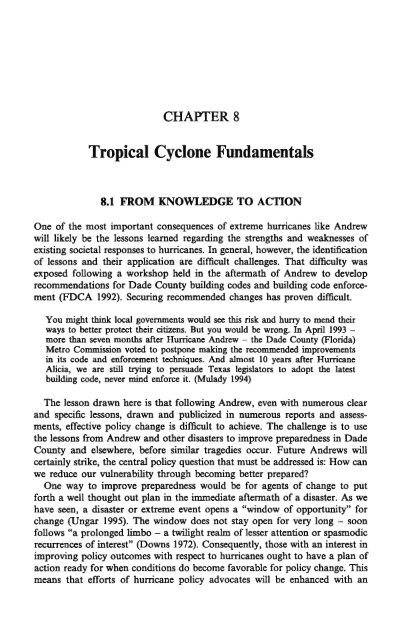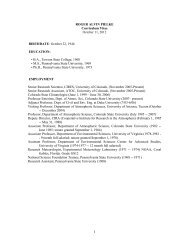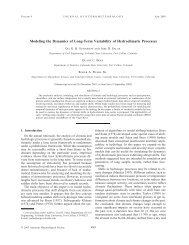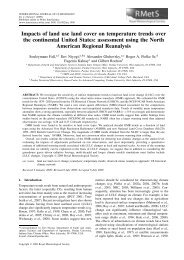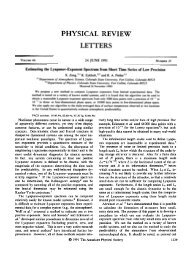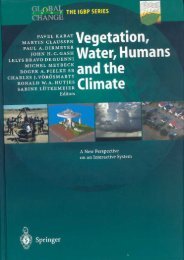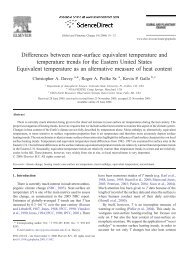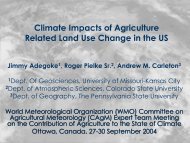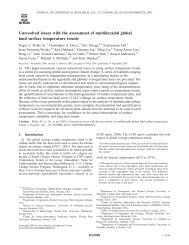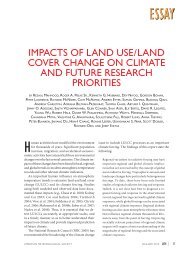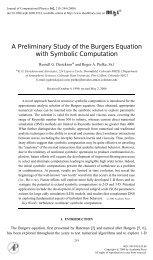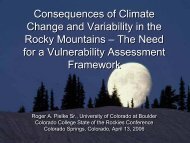- Page 2 and 3:
Hurricanes
- Page 4 and 5:
Copyright @ 1997 by John Wiley & So
- Page 6 and 7:
Dedication Foreword. Preface. Conte
- Page 8 and 9:
CONTENTS 5.3 5.2.3 WindY. . 5.2.4 R
- Page 10 and 11:
Foreword Before the mid-l 960s, stu
- Page 12 and 13:
X11 FOREWORD The lessons of Camille
- Page 14 and 15:
XVI PREFACE One of the fundamental
- Page 16 and 17:
XVlll PREFACE about the need for so
- Page 18 and 19:
2 HURRICANES: THEIR NATURE AND IMPA
- Page 20:
4 HURRICANES: THEIR NATURE AND IMPA
- Page 23 and 24:
INTRODUCfION: SCffiNCE, POLICY, AND
- Page 25 and 26:
INTRODUcnON: SCIENCE, POLICY, AND H
- Page 27 and 28:
INTRODUCTION: SCIENCE, POLICY, AND
- Page 29 and 30:
INTRODUcrION: SCIENCE, POLICY, AND
- Page 31 and 32:
INTRODUcrION: SCIENCE, POLICY, AND
- Page 33 and 34:
I I I I A -Nr"1v ~ r/) ,:,.," 0- 0-
- Page 35 and 36:
INTRODUCfION: SCIENCE, POLICY, AND
- Page 37 and 38:
21 INTRODUCTION: SCIENCE, POLICY, A
- Page 39 and 40:
INTRODUCfION: SCffiNCE, POLICY, AND
- Page 41 and 42:
INTRODUCTION: SCIENCE, POLICY, AND
- Page 43 and 44:
INTRODUCTION: SCIENCE, POLICY, AND
- Page 45 and 46:
INTRODUCfION: SCIENCE, POLICY, AND
- Page 47 and 48:
CHAPTER 2 The US Hurricane Problem
- Page 49 and 50:
THE US HURRICANE PROBLEM human acti
- Page 51 and 52:
THE US HURRICANE PROBLEM of their p
- Page 53 and 54:
THE US HURRICANE PROBLEM 37 2.1.3 S
- Page 55 and 56:
THE US HURRICANE PROBLEM 39 activit
- Page 57 and 58:
THE US HURRICANE PROBLEM Figure 2.3
- Page 59 and 60:
THE US HURRICANE PROBLEM on an intr
- Page 61 and 62:
THE US HURRICANE PROBLEM Table 2.1
- Page 63 and 64:
TIm us HURRICANE PROBLEM ~ I (a) -.
- Page 65 and 66:
THE US HURRICANE PROBLEM emissions)
- Page 67 and 68:
THE US HURRICANE PROBLEM 51 Figure
- Page 69 and 70:
THE US HURRICANE PROBLEM (ODDs) 193
- Page 71 and 72:
THE US HURRICANE PROBLEM 55 Figure
- Page 73 and 74:
THE US HURRICANE PROBLEM preparedne
- Page 75 and 76:
THE US HURRICANE PROBLEM 59 threat
- Page 77 and 78:
nIB US HURRICANE PROBLEM Table 2.3
- Page 79 and 80:
THE US HURRICANE PROBLEM 63 Paralle
- Page 81 and 82:
THE US HURRICANE PROBLEM Congress,
- Page 83 and 84:
THE US HURRICANE PROBLEM 67 Appendi
- Page 85 and 86:
TRC!>PICAL CYCLONES ON PLANET EARTH
- Page 87 and 88:
71 TROPICAL CYCLONES ON PLANET EART
- Page 89 and 90:
TROPICAL CYCLONES ON PLANET EARTH F
- Page 91 and 92:
TROPICAL CYCLONES ON PLANET EARTH F
- Page 93 and 94:
TROPICAL CYCLONES ON PLANET EARTH (
- Page 95 and 96:
TROPICAL CYCLONES ON PLANET EARTH F
- Page 97 and 98:
TROPICAL CYCLONES ON PLANET EARTH o
- Page 99 and 100:
TROPICAL CYCLONES ON PLANET EARTH N
- Page 101 and 102:
TROPICAL CYCLONES ON PLANET EARTH I
- Page 103 and 104:
TROPICAL CYCLONES ON PLANET EARTH 3
- Page 105 and 106:
35 ,~ 20 1201 55 TROPICAL CYCLONES
- Page 107 and 108:
TROPICAL CYCLONES ON PLANET EARTH 9
- Page 109 and 110:
HURRICANE FORECASTS Figure 4.1 The
- Page 111 and 112:
* t " , " ' " i : , , j !' \ HURRIC
- Page 113 and 114:
HURRICANE FORECASTS (e) 7AM ~ ..i~~
- Page 115 and 116:
HURRICANE Fa RECASTS While the news
- Page 117 and 118:
~-~ "'"00 ;-:'O-= -=-~"'" a",.- .->
- Page 119 and 120:
102 HURRICANES: THEIR NATURE AND IM
- Page 121 and 122:
~ 0, 2 ~ 2 ... ~ 0 ~ ~ 0 ':! Is I~
- Page 123 and 124:
106 HURRICANES: THEIR NATURE AND IM
- Page 125 and 126:
108 HURRICANES: THEIR NATURE AND IM
- Page 127 and 128:
~ .I;~ a ;;'0 . ~ ! ~ " 0 'I' -§.
- Page 129 and 130:
112 HURRICANES: THEIR NATURE AND IM
- Page 131 and 132:
114 HURRICANES: THEIR NATURE AND IM
- Page 133 and 134:
116 HURRICANES: THEIR NATURE AND IM
- Page 135 and 136:
CHAPTERS When a hurricane forms, it
- Page 137 and 138:
120 HURRICANES: THEIR NATURE AND IM
- Page 139 and 140:
122 HURRICANES: THEIR NATURE AND IM
- Page 141 and 142:
124 HURRICANES: THEIR NATURE AND IM
- Page 143 and 144:
I ~..;. 126 HURRICANES: THEm NATURE
- Page 145 and 146:
~'\ '" 128 \ '-- HURRICANES: THEIR
- Page 147 and 148: 130 HURRICANES: THEIR NATURE AND IM
- Page 149 and 150: ~ I 00- .". ~ -0( v 1a u .§ ~ ...g
- Page 151 and 152: 134 HURRICANES: THEIR NATURE AND IM
- Page 153 and 154: 136 HURRICANES: THEIR NATURE AND IM
- Page 155 and 156: 138 HURRICANES: THEIR NATURE AND IM
- Page 157 and 158: 140 HURRICANES: THEIR NATURE AND IM
- Page 159 and 160: 142 HURRICANES: THEIR NATURE AND IM
- Page 161 and 162: 144 HURRICANES: THEIR NATURE AND IM
- Page 163 and 164: 146 HURRICANES: THEIR NATURE AND IM
- Page 165 and 166: 148 HURRICANES: THEIR NATURE AND IM
- Page 167 and 168: 150 HURRICANES: THEIR NATURE AND IM
- Page 169 and 170: 152 HURRICANES: THEIR NATURE AND IM
- Page 171 and 172: 154 HURRICANES: THEIR NATURE AND IM
- Page 173 and 174: CHAPTER? 7.1 INTRODUCflON As recoun
- Page 175 and 176: 158 HURRICANES: THEIR NATURE AND IM
- Page 177 and 178: 160 HURRICANES: THEIR NATURE AND IM
- Page 179 and 180: 162 HURRICANES: THEIR NATURE AND IM
- Page 181 and 182: 164 HURRICANES: THEIR NATURE AND IM
- Page 183 and 184: 166 HURRICANES: THEIR NATURE AND IM
- Page 185 and 186: 168 HURRICANES: THEIR NATURE AND IM
- Page 187 and 188: 170 HURRICANES: THEIR NATURE AND IM
- Page 189 and 190: 172 HURRICANES: THEIR NATURE AND IM
- Page 191 and 192: 174 HURRICANES: THEIR NATURE AND IM
- Page 193 and 194: 176 HURRICANES: THEIR NATURE AND IM
- Page 195 and 196: 178 HURRICANES: THEIR NATURE AND IM
- Page 197: 180 HURRICANES: THEIR NATURE AND IM
- Page 201 and 202: 184 HURRICANES: THEIR NATURE AND IM
- Page 203 and 204: 186 HURRICANES: THEIR NATURE AND IM
- Page 205 and 206: 188 HURRICANES: THEIR NATURE AND IM
- Page 207 and 208: 190 HURRICANES: THEIR NATURE AND IM
- Page 209 and 210: 192 HURRICANES: THEIR NATURE AND IM
- Page 211 and 212: APPENDIX A CHAPTER! Byerly, R., 199
- Page 213 and 214: 196 HURRICANES: THEIR NATURE AND IM
- Page 215 and 216: 40 000 30 000 20'000 10 000 APPENDI
- Page 217 and 218: 200 HURRICANES: THEIR NATURE AND IM
- Page 219 and 220: 202 HURRICANES: THEIR NATURE AND IM
- Page 221 and 222: APPENDIX C Selected Data on Tropica
- Page 223 and 224: 206 HURRICANES: THEIR NATURE AND IM
- Page 225 and 226: Figure C.4 Cont: Tracks of intense
- Page 227 and 228: '-'2 ..~ ,-..~ \OQ. ~~ -I" -(') 3.
- Page 229 and 230: APPENDIX C 209 '";ij' 40 Q) ~ C) Q)
- Page 231 and 232: 211 APPENDIX D Table D.2 Eastern No
- Page 233 and 234: APPENDIX D Table D.6 Western Austra
- Page 235 and 236: APPENDIX D Table D.8 Fiji Region Na
- Page 237 and 238: APPENDIX D Table 0.10 Southeast Ind
- Page 239 and 240: : 8. ~A ". ~ 00 tU : V ~ ~ ~ V z 8,
- Page 241 and 242: 220 HURRICANES: THEIR NATURE AND IM
- Page 243 and 244: on "'-va , £.c 0 I::.cp. V'O cn ,'
- Page 246 and 247: . OK OK U ~ ,. , , ..' ..~ '"' Z !
- Page 248 and 249:
UJ ~ UJ P-'-'" s~~ 0 In + In O-o>,V
- Page 250 and 251:
~ =.d.- ~ 0 ..., E-' g S u 'U~ =.g'
- Page 252 and 253:
.s~~ ~...:s ~.9: .- .. ..c ..co " ,
- Page 254 and 255:
APPENDIX E 233
- Page 256 and 257:
APPENDIX E In sum, TDS provides an
- Page 258 and 259:
APPENDIX 0 ~ION E 237 A period of t
- Page 260 and 261:
APPENDIX E IF SITUATION W~S P (alp)
- Page 262 and 263:
29. APPENDIX E p (0) 5 (a/p) T (alp
- Page 264 and 265:
APPENDIX E p (0) p p S T (a/o) (a/p
- Page 266 and 267:
APPENDIX E p p 5 p (alp) (r) S (r)
- Page 268 and 269:
APPENDIX E 247 P (al p p P (alp) p
- Page 270 and 271:
D APPENDIX E s s s s s s S T T T T
- Page 272 and 273:
APPENDIX E 251 IMMEDIATE EMERGENCY
- Page 274 and 275:
APPENDIX E 253 p p T (alp) (a/o) (0
- Page 276 and 277:
APPENDIX E P (a/s) P falsI 5 (alp)
- Page 278 and 279:
~ APPENDIX F 257 lOP = 5/9°C 1°C
- Page 280 and 281:
REFERENCES 259 Nemec, J.M. Nigg <st
- Page 282 and 283:
REFERENCES 261 Cochran, L.
- Page 284 and 285:
REFERENCES 263 Etzioni, A., 1985: M
- Page 286 and 287:
REFERENCES 265 Graham, B., 1992: An
- Page 288 and 289:
REFERENCES 267 Katz, R.W., 1993: To
- Page 290 and 291:
REFERENCES 269 Mesthene, E.G., 1967
- Page 292 and 293:
REFERENCES 271 south Florida. Part
- Page 294 and 295:
REFERENCES 273 Smith, K., 1992: Env
- Page 296 and 297:
REFERENCES 275 Wolensky, R.P. <stro
- Page 298 and 299:
INDEX 277 eye wall concentric eye w
- Page 300:
INDEX silver iodide 112 Simpson, Ro


